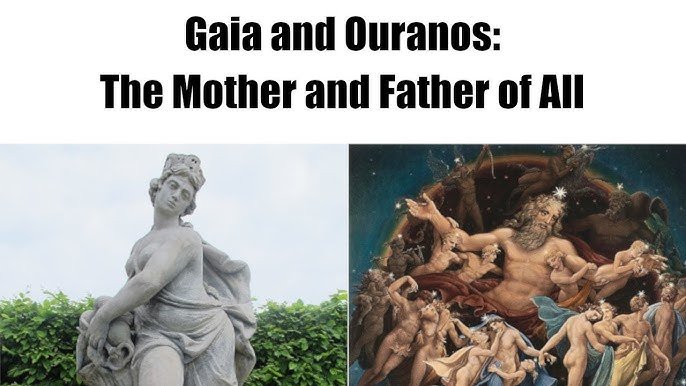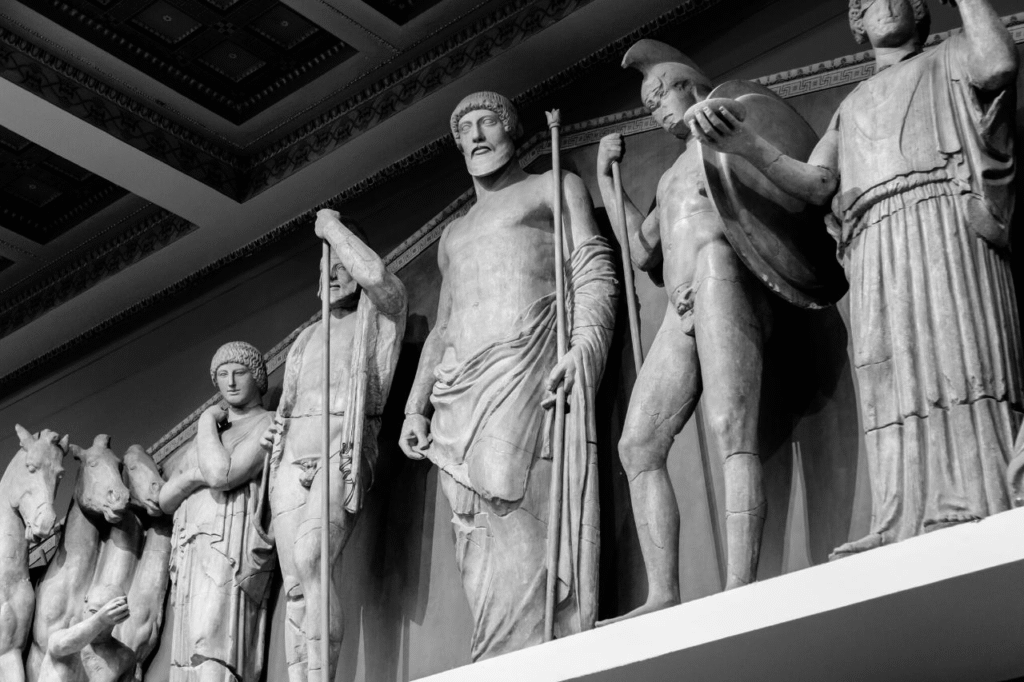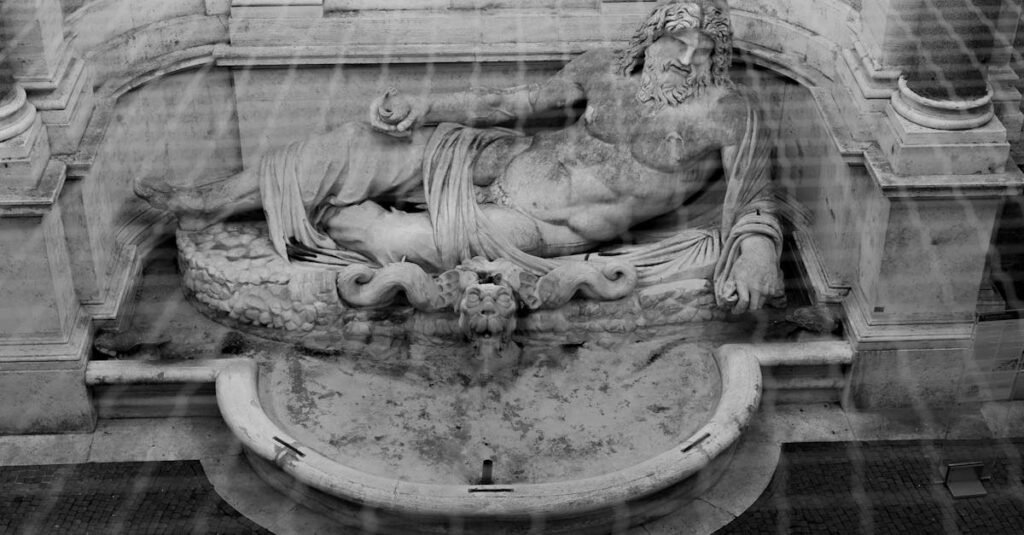Greek myths have had a lasting influence on Western culture, inspiring art, literature, philosophy, and modern storytelling. They are explored in modern movies, books, and video games, showing that their universal themes still resonate today.

1. The Creation of the World: Chaos, Gaia, and Uranus: Greek Myths


The very beginning of Greek mythology is filled with chaos. Chaos was the first primordial entity, representing a void. From this void, the first deities were born:
- Gaia (the Earth) emerged from Chaos and became the mother of everything, including the sky, the seas, and the mountains.
- Uranus (the Sky) was Gaia’s partner, and together they gave birth to the Titans, powerful beings who ruled before the Olympian gods.
However, Uranus was a cruel father and imprisoned his children within Gaia, which angered her. To free them, Gaia enlisted her son Cronus to overthrow Uranus. Cronus castrated Uranus, which symbolized the overthrow of chaos and the establishment of order.
This myth represents the constant struggle between order and chaos, and the cyclical nature of power. It also introduces the idea of the cosmic cycle: older generations are overthrown by younger ones, a theme that repeats itself throughout Greek myths.
2. Prometheus and the Creation of Man

Prometheus, one of the Titans, is credited with the creation of humans and their gift of fire. Zeus, the king of the gods, withheld fire from humanity, but Prometheus defied him by stealing it from Mount Olympus and giving it to mankind.
Prometheus’ act was symbolic of enlightenment and knowledge, with fire representing the gift of civilization and intellect. However, Zeus was enraged and punished Prometheus by having him bound to a rock, where an eagle would eat his liver every day, only for it to regenerate each night.
Prometheus is a symbol of defiance and sacrifice for the greater good. His punishment was immense, but he was revered as the ultimate symbol of intelligence and the human spirit. The myth also explores the relationship between the gods and humans, with the gods representing authority and humans striving for freedom and progress.
3. The Myth of Theseus and the Minotaur

Theseus, the hero of Athens, is famous for slaying the Minotaur, a half-man, half-bull creature that dwelled in the labyrinth of Crete. The Minotaur was the result of a curse on King Minos of Crete, whose wife, Pasiphae, had fallen in love with a bull, resulting in the birth of the beast.
Theseus volunteered to enter the labyrinth and face the Minotaur. With the help of Ariadne, Minos’ daughter, who gave him a ball of thread to navigate the labyrinth, Theseus was able to find and slay the creature, freeing Athens from the tribute it had to pay to Crete.
This myth highlights several themes:
- Courage and Heroism: Theseus’ bravery in facing the Minotaur mirrors the ideals of Greek heroism.
- Intelligence and Strategy: The thread from Ariadne represents the importance of strategy and planning in overcoming challenges.
- The Struggle for Freedom: Athens’ tribute to Crete symbolizes the oppression of smaller states by larger, more powerful ones, and Theseus’ victory represents the triumph of freedom over tyranny.

The story of Oedipus is one of the most tragic in Greek mythology. Oedipus was the son of King Laius and Queen Jocasta of Thebes. A prophecy foretold that Oedipus would kill his father and marry his mother, leading his parents to abandon him. However, Oedipus was found and raised by the king and queen of Corinth, unaware of his true parentage.
As an adult, Oedipus unknowingly fulfilled the prophecy: he killed a man on the road, who was actually his father, and later married Jocasta, his mother. When the truth was revealed, Jocasta took her own life, and Oedipus, devastated by his actions, gouged out his eyes.
The story of Oedipus is a powerful exploration of fate and free will. It delves into the tension between human actions and destiny, suggesting that no matter how hard we try to escape our fate, we may still end up fulfilling it. Oedipus is a symbol of human pride and the consequences of ignoring prophecies, revealing the inevitability of destiny in Greek thought.
5. The Story of Achilles and the Trojan War

Achilles, one of the greatest heroes of Greek mythology, is central to the Trojan War, particularly in Homer’s Iliad. Achilles was nearly invulnerable, except for his heel, which became his fatal weakness. His mother, Thetis, dipped him into the River Styx as an infant to make him invincible, but she held him by his heel, leaving it untouched by the magic waters.
During the Trojan War, Achilles was a nearly unstoppable warrior. However, after a dispute with the Greek leader Agamemnon, Achilles withdrew from the battle, causing the Greeks to suffer heavy losses. Eventually, his close friend Patroclus was killed by Hector, the Trojan prince. Consumed by grief and rage, Achilles re-entered the battle and killed Hector in revenge.
The Achilles’ Heel became a symbol of human vulnerability, showing that even the greatest heroes have weaknesses. The story highlights themes of pride, anger, grief, and revenge. Achilles’ tragic flaw, his uncontrollable rage, leads to his downfall, and his eventual death comes when an arrow strikes his heel—fittingly, the only part of him that wasn’t invulnerable.
6. The Tragic Love of Orpheus and Eurydice

Orpheus, the son of Apollo and the muse Calliope, was the greatest musician and poet of his time. His music was so beautiful that it could charm anything in nature, even inanimate objects. Orpheus married Eurydice, but she was tragically killed by a snake bite on their wedding day.
Orpheus, heartbroken, traveled to the Underworld to retrieve her. Hades, the god of the Underworld, agreed to let Eurydice return to the living world on one condition: Orpheus must not look back at her until they reach the surface. However, Orpheus, overcome with doubt and longing, turned to look at Eurydice before they reached the world above, and she vanished forever.
This myth explores themes of love, loss, and trust. Orpheus’ failure to trust the gods’ word and his inability to wait symbolized the human tendency to act impulsively, even in times of great emotional turmoil. The story also reflects the tension between life and death, showing the fragility of human existence.
7. The Iliad and The Odyssey: Two Epic Tales of War and Adventure

- The Iliad: This epic poem by Homer focuses on the final year of the Trojan War. It primarily deals with the rage of Achilles, the hero of the Greeks, and the consequences of his anger. It explores themes of honor, fate, mortality, and the impact of war on both the victors and the vanquished.
- The Odyssey: Following the Trojan War, Odysseus, the king of Ithaca, embarks on a 10-year journey to return home. Along the way, he faces various challenges, including the Cyclops, the Sirens, and the sorceress Circe. The Odyssey is a tale of perseverance, intelligence, and resilience, emphasizing the importance of homecoming, loyalty, and the consequences of human actions.
Famous Greek Myths:

- The Iliad and The Odyssey: Homer’s two epic poems that detail the Trojan War and the journey of Odysseus.
- The Creation Myths: The origin stories of the world, including the primordial chaos and the rise of gods like Gaia (Earth), Uranus (Sky), and the Titans.
- The Trojan War: The legendary conflict between the Greeks and the Trojans, sparked by Paris’ abduction of Helen, leading to the famous tale of the Trojan Horse.
#GreekMyths#HumanNature#LoveAndPride#FateAndJustice#HeroicJourneys#EpicTales#MythicalEmotions#AncientGreekCulture#anslation#carrerbook
Want to know about Mythology _

